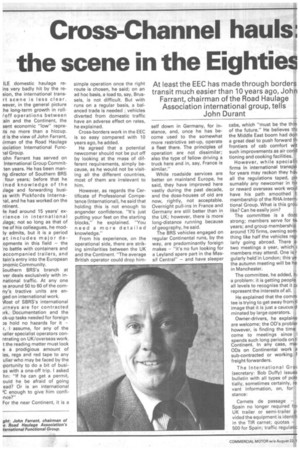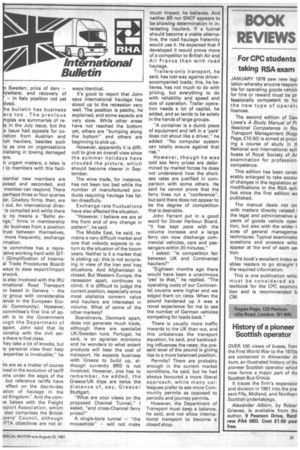Cross-Channel hauls the scene in the Eightiet
Page 20

Page 21

If you've noticed an error in this article please click here to report it so we can fix it.
At least the EEC has made through borders transit much easier than 10 years ago, John Farrant, chairman of the Road Haulage Association international group, tells John Durant
ILE domestic haulage reins very badly hit by the resion, the international transrt scene is less clear. ('ever, in the general picture he long-term growth in roll/off operations between am n and the Continent, the sent economic "low" repreits no more than a hiccup. it is the view of John Farrant, iirman of the Road Haulage ;ociation International Funclal Group.
ohn Farrant has served on International Group Committen years. He has been manng director of Southern BRS four years; before that he ined knowledge of the Jlage and forwarding busiS with Pickfords Internanal, and he has worked on the ntinent.
le had around 15 years' exrience in international _siege; not so long as that of ne of his colleagues, he modly admits, but it is a period at includes major deopments in this field — the ro battle with containers and accompanied trailers, and tam's entry into the European Dnomic Community.
iouthern BRS's branch at ver deals exclusively with innational traffic. At any one le around 50 to 60 of the cornny's tractive units are enged on international work.
Vlost of SBRS's international
J rneys are for contracted )rk. Documentation and the ck-up tasks needed for foreign Ds hold no hazards for it — r, I assume, for any of the sailer specialist operators conntrating on UK/overseas work. t the reading matter must look
e a prodigious amount of [es, regs and red tape to any ulier who may be faced by the Iportunity to do a bit of busiss with a one-off trip. I asked hn: "If he can get a permit, ould he be afraid of going ead? Or is an international 'C enough to give him confiince?"
For the near Continent, it is a simple operation once the right route is chosen, he said; on an ad hoc basis, a load to, say, Brussels, is not difficult. But with runs on a regular basis, a balanced trade is needed ; vehicles diverted from domestic traffic have an adverse effect on rates, he explained.
Cross-borders work in the EEC is so easy compared with 10 years ago, he added.
He agreed that a potential newcomer should not he put off by looking at the mass of different requirements, simply because, as he would not be visiting all the different countries, most of them are irrelevant to him.
However, as regards the Certificate of Professional Competence (International), he said that holding this is not enough to engender confidence. "It's just putting your feet on the starting blocks," he explained. "You need a more detailed knowledge."
From his experience, on the operational side, there are striking similarities between the UK and the Continent. "The average British operator could drop him
self down in Germany, for instance, and, once he has become used to the somewhat more restrictive set-up, operate a fleet there. The principles of operation are not dissimilar; also the type of fellow driving a truck here and in, say, France is similar."
While roadside services are better on mainland Europe, he said, they have improved here vastly during the past decade, and the doss-houses of old are now, rightly, not acceptable. Overnight pull-ins in France and Germany are still better than in the UK; however, there is more long-distance running because of geography, he said.
The BRS vehicles engaged on regular Continental runs, by the way, are predominantly foreign makes — "it's no fun looking for a Leyland spare part in the Massif Central" — and have sleeper cabs, which "must be the thin of the future." He believes thE the Middle East boom had don a great deal to push forward th frontiers of cab comfort wit such improvements as air cond tioning and cooking facilities.
However, while speciali: firms in international transpo for years may reckon they haN, all the regulations taped, pr( sumably any newcomer in his or reward overseas work woul have his path smoothed t membership of the RHA,Interm tional Group. What is this grou like? Can he easily join?
The committee is a doze strong; members serve for tyk, years; and group membership around 170 firms, owning som thing like half the vehicles regi larly going abroad. There a two meetings a year, which members may attend. One is r gularly held in London; this ye the autumn meeting will be he in Manchester.
The committee, he added, hi a problem: it is getting people all levels to recognise that it cz' represent the interests of all.
He explained that the comm tee is trying to get away from ti image that it is just a caucus d minated by large operators.
Owner-drivers, he explaine are welcome; the OD's probles however, is finding the time come to meetings since I spends such long periods on tl Continent. In any case, mai ODs on Continental work a sub-contracted or working f freight forwarders.
The International Gros (secretary: Bob Duffy) issues bulletin with all types of pote tially, sometimes certainly, re vant information, on, for stance: Carnets de passage — Spain no longer required for UK trailer or semi-trailer p vided the equipment is identifi in the TIR carnet; quotas — 500 for Spain; traffic regulatic n Sweden; price of dery — rywhere; and recovery of — in Italy position not yet )Ived.
he bulletin has business ers too . The previous moles are summaries of rets in the July issue, but the e issue had appeals for coration from Austrian and ich hauliers, besides such ls as one on organisations cialising in towing damaged lers.
n urgent matters, a telex is t to members with this facil
otential new members are posed and seconded, and member can respond. There perhaps three or four queries 3ar. Cowboy firms, then, are t out. An international direcis compiled and while there w no means a "Baltic exnge," firms in membership do business from a position trust between themselves, more frequently, exchange rmation.
le committee has a repre:ative working hard with SIT) (Simplification of Interneal Trade Procedures Board) Nays to ease export/import erwork.
is also involved with the IRU :mational Road Transport )r) based in Geneva — the
group with considerable lence in the European Ecoiic Community). However, committee's first line of apich is to the Government 3ugh the Department of 'sport. John said that its :ionship with the civil sers there is first class.
-hey take a lot of knocks, but iy personal view their help expertise is invaluable," he
Ve are as a matter of course lved in the evolution of tariff ams under the aegis of the but reference tariffs have effect on the day-to-day ation of haulage in the ad Kingdom." And the corn)e liaises with the Freight 'sport Association, which also comprises the British ipers' Council, although /FTA objectives are not al ways identical.
It's good to report that John says international haulage has stood up to the recession very well. The position is patchy, he explained, and some aspects are very slow. While other areas have not reached the bottom yet, others are "bumping along the bottom" and others are beginning to pick up.
However, apparently it is difficult to give an overall view since the summer holidays have clouded the picture, which should become clearer in September.
The wine trade, for instance, has not been too bad while the number of manufactured products requiring haulage has fallen dreadfully.
Exchange rate fluctuations have also affected the situation.
"However, I believe we are at the, front end of any change in pattern", he said.
The Middle East, he said, remains a very difficult market and one that nobody expects to return to the situation of the boom years. Neither is it a market that is picking up; this is not surprising in view of the Iran and Iraq situations. And Afghanistan is closed. But Western Europe, the recession apart, continues to climb. It is difficult to judge the current position, especially since most statistics concern value and hauliers are interested in volume. What of some of the other markets?
Scandinavia, Denmark apart, does not generate much trade, although there are specialist UK/Sweden runs. Portugal, he said, is an agrarian economy and he wonders to what extent products will bear the cost of transport. He expects business with Greece to build up, although currently BRS is not involved. However, one has to remember, he added, the Greece/UK trips are twice the distance of, say, Greece/ Stuttgart.
"What are your views on the proposed Channel Tunnel," I asked, "and cross-Channel ferry prices?"
A single-bore tunnel — "the mousehole" — will not make
much impact, he believes. And neither BR nor SNCF appears to be showing determination in interesting hauliers. If a tunnel should become a viable alternative, the road haulage fraternity would use it. He expected that if developed it would prove more of a competitor to British Air and ,Air France than with road haulage.
Trailers-only transport, he said, has lost way against driveraccompanied loads; this, he believes, has not much to do with pricing, but everything to do with reliability and speed and size of operation. Trailer operation needs a lot of capital, he added, and so tends to be solely in the hands of large groups.
"A container is a dumb piece of equipment and left in a 'park' does not shout like a driver," he added. "No computer system can totally ensure against that risk."
However, though he was told sea ferry prices are determined by market forces he does not understand how the shortsea rates are justified in comparison with some others. He said he cannot prove that the ferry lines run a "conference", but said there does not appear to be the degree of competition that is desirable.
John Farrant put in a good word for Dover Harbour Board. "It has kept pace with the volume increase and a large ferry can now discharge commercial vehicles, cars and passengers within 20 minutes."
I asked: "Is competition fair between UK and Continental hauliers?"
"Eighteen months ago there would have been a unanimous 'yes' to that," he replied. "The operating costs of our Continental cousins were higher and we edged them on rates. When the pound hardened up it was a novel experience for me to see the number of German vehicles competing for loads back."
There is usually more traffic inwards to the UK than out, and this unbalances the transport equation, he said, and backloading influences the rates; the present level of the pound is giving rise to a more balanced position.
Permits? There are probably enough in the current market conditions, he said, but he had always favoured a more liberal approach, while many colleagues prefer to see more Community permits as opposed to periodic and journey permits.
However, the Department of Transport must keep a balance, he said, and not allow international transport to become a closed shop.




























































